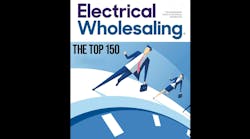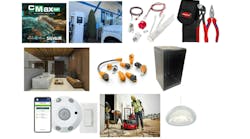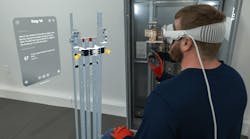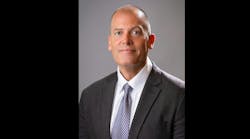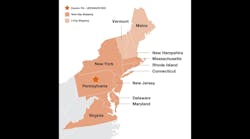United States Senators and Representatives got the real-world business perspective of electrical distributors from their districts on a number of issues last month when a pack of about 30 members of the National Association of Electrical Distributors (NAED) descended on Washington, D.C., on Sept. 7-8 for the association's first-ever Congressional Fly-In.
No word yet on whether the meetings changed any minds in Congress, but it wasn't from a lack of trying. NAED members representing 22 companies sat down with their legislators individually and in small groups to discuss some of the major legislative topics of concern to distributors, including protecting “last-in, first-out” (LIFO) accounting practices, promoting energy efficiency and rolling back regulatory over-reach.
In preparation for the Fly-In, about 35 distributors got some intensive civics lessons through webinars and e-mail exchanges in the weeks before the trip. Due to some last-minute cancellations, about 32 people including NAED staff gathered in the Washington on Sept. 7, said Ed Orlet, NAED's V.P. of development and government affairs.
The first day included an orientation led by Stephanie Vance of Advocacy Associates, a lobbying consultant NAED contracted with, who was key to setting up the meetings, Orlet said. “She's an ex-Hill-staffer, she knows the way Washington works, and she has set up a database that's slick. We worked closely with her on scheduling the meetings, she put out the invites, consulted with us on who they want to see when. They really knew what they were doing.”
The next day, after a breakfast keynote presentation and question-and-answer session with Sen. Rand Paul (R-Ky.), who is co-sponsoring a bill NAED supports that would force more accountability for government regulation of business, the distributors hit the Senate and House office buildings.
Altogether the distributors attended about 100 meetings with their legislators in one day, said Orlet.
“We told them to think of it as a day of making sales calls,” Orlet said. “The meetings can be five minutes in a hallway with a staffer or half an hour with a senator who's feeling talkative. You've got to be cognizant of where you need to be when, and our guys are pros at that. We told them to talk about their business and not try to be policy experts. They were comfortable with that and did a great job.”
Orlet said much of the success was due to the distributors' preparations. “Some of them, without our prompting, created hand-outs specific to their companies, especially about LIFO. It said, ‘here's the economic impact on our company, here's what it's going to cost and here's the jobs we won't be able to create over the five years or whatever it is to phase LIFO out.’ In Washington, you have to translate everything into jobs.”
Although a number of other associations representing the electrical industry and wholesale distributors have active long-established Congressional lobbying organizations, NAED decided to set up the Fly-In after members expressed concern that Washington was moving further away from support of business. NAED is careful to coordinate with rather than duplicate the work of groups such as the National Electrical Manufacturers Association (NEMA), the National Association of Wholesaler-Distributors (NAW), the National Association of Manufacturers (NAM) and the U.S. Chamber of Commerce.
“Historically this hasn't been a big priority for NAED, but our members felt there's been a change in Washington, and they need to have a voice,” Orlet says. “We have a mandate not to duplicate the work of those groups — a mandate to work with them as a force-multiplier. NEMA doesn't have an operation in every Congressional district in the United States. But we have at least a branch in just about every district. That carries a lot of weight. We can have a conversation at the district level and that opens up the conversations in Washington.”
NAED modeled its Fly-In on similar efforts from the heating and air-conditioning market. The Heating Airconditioning & Refrigeration Distributors International (HARDI) is an association of distributors whose business models and legislation concerns are very similar to those of electrical distributors. HARDI, based in Columbus, Ohio, has held Congressional Fly-Ins for about five years. Orlet was invited to join them for their Fly-In last year to learn first-hand how the process works, and reciprocated by bringing someone from HARDI along for the NAED Fly-In this month.
Based on the success of this initial effort, Orlet says NAED will definitely do it again next year. He expects the number of distributors involved to grow.
“Our board is fired up about it,” he said. “It's a very important activity, but we also had a lot of fun.”
Policy Pleas
The National Association of Electrical Distributors (NAED) concentrated on key policy areas distributors share in its visits with senators and representatives on Capitol Hill during the group's first Congressional Fly-In, Sept. 7-8. Distributors were free to bring up whatever was on their minds, but Ed Orlet, NAED's vice president of development and government affairs, asked them to keep the focus on business, and advised them to avoid going into the meetings with a laundry list of demands. Instead he placed the primary focus on the impact of policy proposals on their businesses in three areas:
LIFO
Last-in, first-out accounting for inventory is widely used among distributors. With the Congressional joint “Super Committee” considering all options for slashing federal spending, LIFO has come up as potentially a part of the solution. The administration has keyed on LIFO as an accounting method preferred by oil companies, but distributors wanted to make it clear that changing the law would have widespread impact far beyond the oil patch. “Even some distributors who don't use LIFO were making a great case for protecting it,” said Orlet.
Energy efficiency
The electrical industry's potential for helping businesses and individuals reduce their energy consumption by adopting new, more efficient technologies was a key point and “a good bipartisan issue,” said Orlet, especially for discussions with more liberal representatives.
Regulatory over-reach
The continuing expansion of burdens from federal regulations on business was a hot topic among distributors, who sought legislators' support in resisting new regulations in areas ranging from labor relations to taxation and rolling back existing legislation that adds to the challenges all businesses face when making decisions about hiring or expansions.
